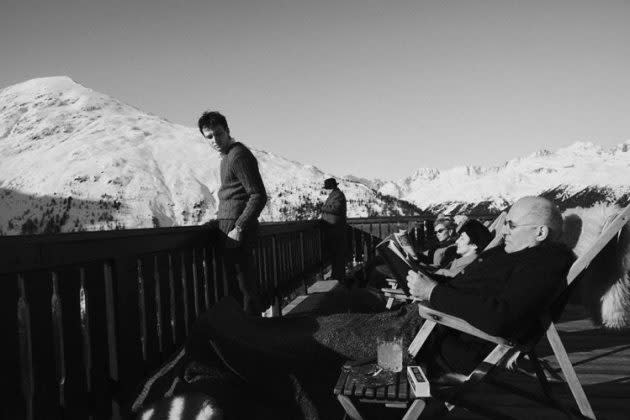‘The Universal Theory’ Review: A Sumptuous Homage to Hitchcock Packaged as a Metaphysical Noir
- Oops!Something went wrong.Please try again later.

Imagine that one of Hitchcock’s villains — say, the guy missing the tip of a pinkie in “The 39 Steps,” or the shrink who runs the institute in “Spellbound” — did not simply come from a place of murderous intent but from a different place altogether, perhaps another dimension. Imagine that villain’s supranatural malfeasance backdropped by jagged mountains, captured in black-and-white so crisp it could cut, and widescreen frames so wide whole Alpine ranges fit comfortably inside them. And imagine it all unfolding to a deliberately overpowering score, like Bernard Herrman and Scott Walker conceived a baby during a sonic boom. Now you are somewhere near Timm Kröger’s superbly crafted “The Universal Theory” an overlong but enjoyable metaphysical thriller that delivers pastiche so meticulous it becomes its own source of supremely cinematic pleasure.
It is 1962, in the mountainous Grisons canton of Switzerland. The Cold War is at its coldest, its influence extending across this neutral Mitteleuropean region like the thick snow that blankets the slopes. Avalanches are frequent. Storms even more so. Strange skidding cloud formations arc over the uncanny valley where a remote, creakily luxe hotel is playing host to a mysterious physics congress. Still in the throes of finishing his “esoteric” thesis, Johannes (Jan Bülow) has come along on the coat-tails of his crotchety supervisor, Dr. Strathen (Hanns Zischler), who brooks none of Johannes’ “speculative” nonsense about multiverses. “Shut up and calculate!” he barks, red-penning whole sections of Johannes’ work.
More from Variety
The conference keeps getting postponed due to the no-show of its keynote speaker. But in the meantime Johannes has met Professor Blumberg (Gottfried Breitfuss), a jovial, rotund erstwhile Nobel nominee with whom Strathen has some ancient beef, and who immediately recognizes the revolutionary potential of Johannes’ theories. Or maybe that’s just the booze and LSD speaking. But by now Johannes has also encountered Karin (Olivia Ross) an enigmatic Frenchwoman who plays piano with the hotel’s jazz band, and around whom Johannes feels a strange déjà vu — accented wittily by composer Diego Ramos Rodríguez’s love theme, which echoes that of “Vertigo,” the ultimate tale of doubling and obsessive love. The fact that Karin can relate entire stories from Johannes’ childhood that he’s never told anyone does little to disavow him of the notion of their peculiar connection.
But in the mountains nearby (which are such characters here they almost seem to talk to each other on the soundtrack, showing the more thunderous side of Rodríguez’s multifaceted score) a pulsating light flickers deep with the warren of tunnels left over from the days of uranium mining. It must be somehow related to Karin’s disappearance. And to a strange accident involving two local kids. And to the sinister figures Johannes spots on the mountainside, after Blumberg is found dead in the snow. Very dead, in fact, which makes it very odd that he keeps showing up again, alive and intent on some nefarious purpose that Johannes cannot fathom.
The actual solution of the “mystery” — or rather the nested set of mysteries — is rather simple, once one swallows the central speculative sci-fi aspect, which, with multiverse theory popping up in every second superhero blockbuster these days, it’s not hard to do. But then, the story, written by Kröger and Roderick Warich, feels like it’s been designed primarily to give free rein to an expansive visual imagination, rather than the other way round, like the narrative is simply a loop on which Kröger (himself sometimes a cinematographer) can team up with DP Roland Stuprich to hang a rich assortment of cinematic influences. It’s not just Hitchcock who is so ably evoked: The prologue is a terrifically well-achieved riff on 1980s TV in which Johannes, here a kind of Fassbinder figure complete with unhealthy pallor, scraggly facial hair and flopsweat, goes on a German talk show to promote his bestselling sci-fi novel. And the entire last chapter of the film unfolds as a quasi-homage to the French New Wave, with a drolly authoritative voiceover reporting on how Johannes’ life – marked forever by his quest to reunite with his lost love, Karin — will unfold, right up until the moment of his death.
There is, perhaps, a slightly missed opportunity for a few more twists of the metaphysical knife in the plotting. However porous the membrane between various planes, we remain resolutely on this side of this one. But then, this is a movie that lives in its atmosphere rather than its story, and if we were skipping through other worlds, Kröger wouldn’t be able to make such evocative work of the history of this one. References to the early-’60s psychedelic experiment or to both the older physicists having Third Reich skeletons in their closets contribute to the sense of nuclear-age paranoia, which “The Universal Theory” imagines as the fear — ridiculous but strangely relatable — of inadvertently ending up stuck with the wrong version of yourself, living in the wrong universe.
Best of Variety
Sign up for Variety’s Newsletter. For the latest news, follow us on Facebook, Twitter, and Instagram.
